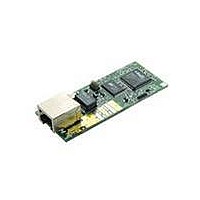101-0681 Rabbit Semiconductor, 101-0681 Datasheet - Page 17

101-0681
Manufacturer Part Number
101-0681
Description
KIT DEVELOPMENT RCM3700 INT'L
Manufacturer
Rabbit Semiconductor
Series
RabbitCore 3000r
Type
MPU Moduler
Datasheet
1.101-0522.pdf
(169 pages)
Specifications of 101-0681
Contents
RabbitCore Module, Dev. Board, AC Adapter, Cable and Dynamic C® CD-Rom
Processor To Be Evaluated
Rabbit 3000
Interface Type
Ethernet
Maximum Operating Temperature
+ 70 C
Minimum Operating Temperature
- 40 C
Operating Supply Voltage
4.75 V to 5.25 V
For Use With/related Products
RCM3700
Lead Free Status / RoHS Status
Contains lead / RoHS non-compliant
Other names
101-681
101-681
101-681
Available stocks
Company
Part Number
Manufacturer
Quantity
Price
Company:
Part Number:
101-0681
Manufacturer:
Rabbit
Quantity:
201
- Current page: 17 of 169
- Download datasheet (2Mb)
3.1 Introduction
To help familiarize you with the RCM3700 modules, Dynamic C includes several sample
programs. Loading, executing and studying these programs will give you a solid hands-on
overview of the RCM3700’s capabilities, as well as a quick start with Dynamic C as an
application development tool.
In order to run the sample programs discussed in this chapter and elsewhere in this manual,
1. Your RCM3700 must be plugged in to the Prototyping Board as described in Chapter 2,
2. Dynamic C must be installed and running on your PC.
3. The programming cable must connect the programming header (J2) on the RCM3700
4. Power must be applied to the RCM3700 through the Prototyping Board.
Refer to Chapter 2, “Getting Started,” if you need further information on these steps.
To run a sample program, open it with the
F9
Complete information on Dynamic C is provided in the Dynamic C User’s Manual.
RabbitCore RCM3700 User’s Manual
. The RCM3700 must be connected to a PC using the programming cable.
“Getting Started.”
to your PC.
To develop and debug programs for the RCM3700 (and for all
other Rabbit hardware), you must install and use Dynamic C.
NOTE: The sample programs assume that you have at least an elementary grasp of the C
programming language. If you do not, see the introductory pages of the Dynamic C
User’s Manual for a suggested reading list.
3. R
UNNING
File
S
menu, then compile and run it by pressing
AMPLE
P
ROGRAMS
15
Related parts for 101-0681
Image
Part Number
Description
Manufacturer
Datasheet
Request
R

Part Number:
Description:
COMPUTER SNGLBD BL2101 A/D 0-10V
Manufacturer:
Rabbit Semiconductor

Part Number:
Description:
CARD D/A 0-10V SR9400 SMARTSTAR
Manufacturer:
Rabbit Semiconductor
Datasheet:

Part Number:
Description:
CARD A/D 0-10V SR9300 SMARTSTAR
Manufacturer:
Rabbit Semiconductor
Datasheet:

Part Number:
Description:
WiFi / 802.11 Modules & Development Tools WIRELESS CONTROL APP KIT
Manufacturer:
Rabbit Semiconductor

Part Number:
Description:
KIT DEV RABBITCORE RCM3750
Manufacturer:
Rabbit Semiconductor
Datasheet:

Part Number:
Description:
KIT DEV RABBIT 2000 INT'L
Manufacturer:
Rabbit Semiconductor
Datasheet:

Part Number:
Description:
KIT DEV RABBIT RCM2000 INT'L
Manufacturer:
Rabbit Semiconductor
Datasheet:

Part Number:
Description:
BL4S200 TOOL KIT
Manufacturer:
Rabbit Semiconductor
Datasheet:

Part Number:
Description:
MODULE RABBITCORE RCM3720
Manufacturer:
Rabbit Semiconductor
Datasheet:

Part Number:
Description:
MODULE RABBITCORE RCM3220
Manufacturer:
Rabbit Semiconductor
Datasheet:

Part Number:
Description:
MODULE RABBITCORE RCM3210
Manufacturer:
Rabbit Semiconductor
Datasheet:

Part Number:
Description:
COMPUTER SGL-BOARD OP6600 W/SRAM
Manufacturer:
Rabbit Semiconductor
Datasheet:

Part Number:
Description:
COMPUTER SGL-BD BL2000 SRAM/FLSH
Manufacturer:
Rabbit Semiconductor












